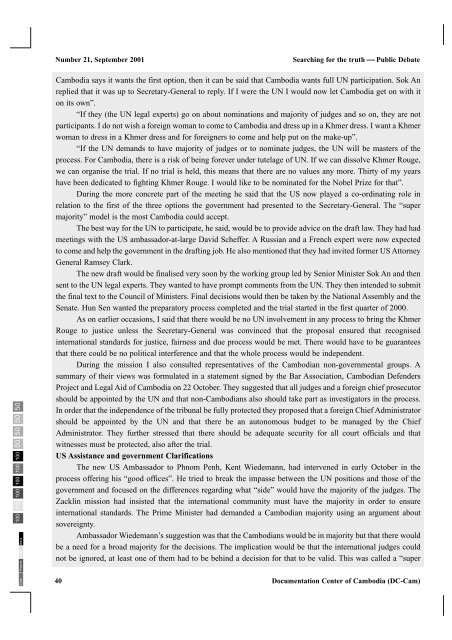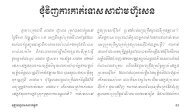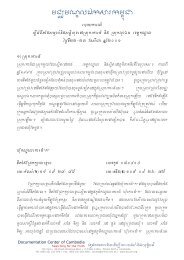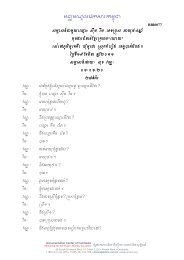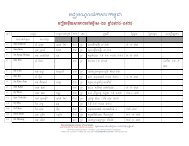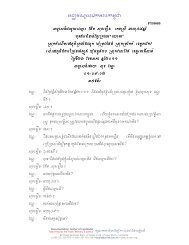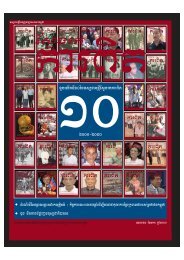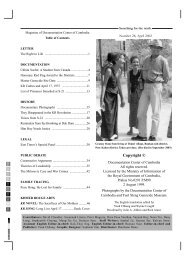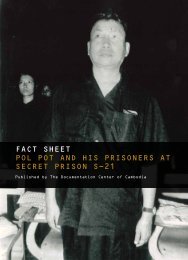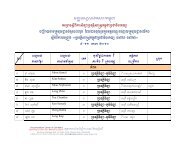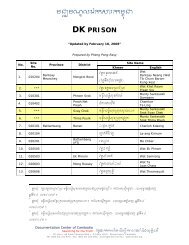Searching for the truth Issues 21 - Documentation Center of Cambodia
Searching for the truth Issues 21 - Documentation Center of Cambodia
Searching for the truth Issues 21 - Documentation Center of Cambodia
You also want an ePaper? Increase the reach of your titles
YUMPU automatically turns print PDFs into web optimized ePapers that Google loves.
100 100 100 100 100 100 50 50 50 50<br />
Black<br />
Yellow<br />
Magenta<br />
Cyan<br />
Number <strong>21</strong>, September 2001<br />
40<br />
<strong>Searching</strong> <strong>for</strong> <strong>the</strong> <strong>truth</strong> ⎯ Public Debate<br />
<strong>Cambodia</strong> says it wants <strong>the</strong> first option, <strong>the</strong>n it can be said that <strong>Cambodia</strong> wants full UN participation. Sok An<br />
replied that it was up to Secretary-General to reply. If I were <strong>the</strong> UN I would now let <strong>Cambodia</strong> get on with it<br />
on its own”.<br />
“If <strong>the</strong>y (<strong>the</strong> UN legal experts) go on about nominations and majority <strong>of</strong> judges and so on, <strong>the</strong>y are not<br />
participants. I do not wish a <strong>for</strong>eign woman to come to <strong>Cambodia</strong> and dress up in a Khmer dress. I want a Khmer<br />
woman to dress in a Khmer dress and <strong>for</strong> <strong>for</strong>eigners to come and help put on <strong>the</strong> make-up”.<br />
“If <strong>the</strong> UN demands to have majority <strong>of</strong> judges or to nominate judges, <strong>the</strong> UN will be masters <strong>of</strong> <strong>the</strong><br />
process. For <strong>Cambodia</strong>, <strong>the</strong>re is a risk <strong>of</strong> being <strong>for</strong>ever under tutelage <strong>of</strong> UN. If we can dissolve Khmer Rouge,<br />
we can organise <strong>the</strong> trial. If no trial is held, this means that <strong>the</strong>re are no values any more. Thirty <strong>of</strong> my years<br />
have been dedicated to fighting Khmer Rouge. I would like to be nominated <strong>for</strong> <strong>the</strong> Nobel Prize <strong>for</strong> that”.<br />
During <strong>the</strong> more concrete part <strong>of</strong> <strong>the</strong> meeting he said that <strong>the</strong> US now played a co-ordinating role in<br />
relation to <strong>the</strong> first <strong>of</strong> <strong>the</strong> three options <strong>the</strong> government had presented to <strong>the</strong> Secretary-General. The “super<br />
majority” model is <strong>the</strong> most <strong>Cambodia</strong> could accept.<br />
The best way <strong>for</strong> <strong>the</strong> UN to participate, he said, would be to provide advice on <strong>the</strong> draft law. They had had<br />
meetings with <strong>the</strong> US ambassador-at-large David Scheffer. A Russian and a French expert were now expected<br />
to come and help <strong>the</strong> government in <strong>the</strong> drafting job. He also mentioned that <strong>the</strong>y had invited <strong>for</strong>mer US Attorney<br />
General Ramsey Clark.<br />
The new draft would be finalised very soon by <strong>the</strong> working group led by Senior Minister Sok An and <strong>the</strong>n<br />
sent to <strong>the</strong> UN legal experts. They wanted to have prompt comments from <strong>the</strong> UN. They <strong>the</strong>n intended to submit<br />
<strong>the</strong> final text to <strong>the</strong> Council <strong>of</strong> Ministers. Final decisions would <strong>the</strong>n be taken by <strong>the</strong> National Assembly and <strong>the</strong><br />
Senate. Hun Sen wanted <strong>the</strong> preparatory process completed and <strong>the</strong> trial started in <strong>the</strong> first quarter <strong>of</strong> 2000.<br />
As on earlier occasions, I said that <strong>the</strong>re would be no UN involvement in any process to bring <strong>the</strong> Khmer<br />
Rouge to justice unless <strong>the</strong> Secretary-General was convinced that <strong>the</strong> proposal ensured that recognised<br />
international standards <strong>for</strong> justice, fairness and due process would be met. There would have to be guarantees<br />
that <strong>the</strong>re could be no political interference and that <strong>the</strong> whole process would be independent.<br />
During <strong>the</strong> mission I also consulted representatives <strong>of</strong> <strong>the</strong> <strong>Cambodia</strong>n non-governmental groups. A<br />
summary <strong>of</strong> <strong>the</strong>ir views was <strong>for</strong>mulated in a statement signed by <strong>the</strong> Bar Association, <strong>Cambodia</strong>n Defenders<br />
Project and Legal Aid <strong>of</strong> <strong>Cambodia</strong> on 22 October. They suggested that all judges and a <strong>for</strong>eign chief prosecutor<br />
should be appointed by <strong>the</strong> UN and that non-<strong>Cambodia</strong>ns also should take part as investigators in <strong>the</strong> process.<br />
In order that <strong>the</strong> independence <strong>of</strong> <strong>the</strong> tribunal be fully protected <strong>the</strong>y proposed that a <strong>for</strong>eign Chief Administrator<br />
should be appointed by <strong>the</strong> UN and that <strong>the</strong>re be an autonomous budget to be managed by <strong>the</strong> Chief<br />
Administrator. They fur<strong>the</strong>r stressed that <strong>the</strong>re should be adequate security <strong>for</strong> all court <strong>of</strong>ficials and that<br />
witnesses must be protected, also after <strong>the</strong> trial.<br />
US Assistance and government Clarifications<br />
The new US Ambassador to Phnom Penh, Kent Wiedemann, had intervened in early October in <strong>the</strong><br />
process <strong>of</strong>fering his “good <strong>of</strong>fices”. He tried to break <strong>the</strong> impasse between <strong>the</strong> UN positions and those <strong>of</strong> <strong>the</strong><br />
government and focused on <strong>the</strong> differences regarding what “side” would have <strong>the</strong> majority <strong>of</strong> <strong>the</strong> judges. The<br />
Zacklin mission had insisted that <strong>the</strong> international community must have <strong>the</strong> majority in order to ensure<br />
international standards. The Prime Minister had demanded a <strong>Cambodia</strong>n majority using an argument about<br />
sovereignty.<br />
Ambassador Wiedemann’s suggestion was that <strong>the</strong> <strong>Cambodia</strong>ns would be in majority but that <strong>the</strong>re would<br />
be a need <strong>for</strong> a broad majority <strong>for</strong> <strong>the</strong> decisions. The implication would be that <strong>the</strong> international judges could<br />
not be ignored, at least one <strong>of</strong> <strong>the</strong>m had to be behind a decision <strong>for</strong> that to be valid. This was called a “super<br />
<strong>Documentation</strong> <strong>Center</strong> <strong>of</strong> <strong>Cambodia</strong> (DC-Cam)


